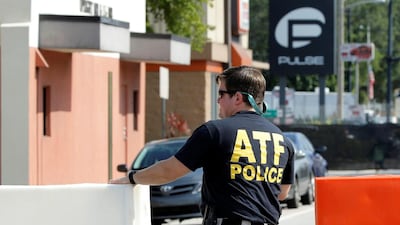‘I called it,” said Donald Trump, referring to the Pulse nightclub in Orlando, less than 24 hours after the horrific shootings there last Sunday. While families and friends were reeling from the aftermath of the tragedy, Mr Trump was busy scoring political points. “Appreciate the congrats for being right on radical Islamic terrorism,” Mr Trump wrote on Twitter that day.
It appears that Omar Mateen declared allegiance to ISIL before he went on a killing spree. But it also appears that he did the same for Hizbollah, ISIL’s avowed enemy. So it’s not clear what, if any, “Islamic” goals he had in mind.
Mr Trump has reasserted that Muslims should be banned from entering the United States. But Mateen, a son of an Afghan immigrant, was born in the US.
Mr Trump is not alone in underlining what he believes to be facts in this tragedy to back up his theory. There are others who are doing the same to prove their analysis right.
The call for greater surveillance and profiling of Muslims as a solution to terrorism should be under scrutiny. Mateen was already known and interviewed by the FBI on two occasions. His father has been reported to be a known CIA asset.
Surprisingly, alongside the FBI interviews Mateen continued to be permitted to carry firearms for a security role at G4S, even though it is alleged that he had openly expressed racist feelings and also made threats to co-workers. Their reports were ignored by superiors.
Since the attack was aimed at the gay community, it is argued that Mateen, a Muslim, was motivated by his religion to commit the atrocity. But by all accounts, he was far from being a practising Muslim. He beat his former wife. He drank. He was openly racist. And, in contravention to Islamic principles, he thought it was OK to kill people.
In fact, some reports suggest that Mateen frequented the gay nightclub and was known to partake in its activities, raising questions about whether he could reconcile the various facets of his identity and whether anger and self-hatred were at the root of his violent mind.
Whatever the reasons, one thing is clear – there is no single answer to the question why Mateen did it. This is hard to digest, especially considering that most politicians promote simplistic agendas, while news coverage relies on simplistic analysis.
This must be a turning point in our understanding that the causes of terror are not one-dimensional, nor do people travel along a single conveyor belt of radicalisation.
Experts have been telling us this for years, but the many layers of the tragedy in Orlando must finally put politicians and policymakers under pressure to admit that this is a complex area.
It is simply not good enough to talk of the problem being “Islamic” or emanating from hatred towards the United States. The issues are complex and they require a multi-pronged solution.
Orlando was a tragedy. But if we don’t admit to the complexity of the roots of terrorism, then we can never fully address and eradicate such occurrences, and that will be a bigger tragedy.
Shelina Zahra Janmohamed is the author of Love in a Headscarf and blogs at www.spirit21.co.uk

